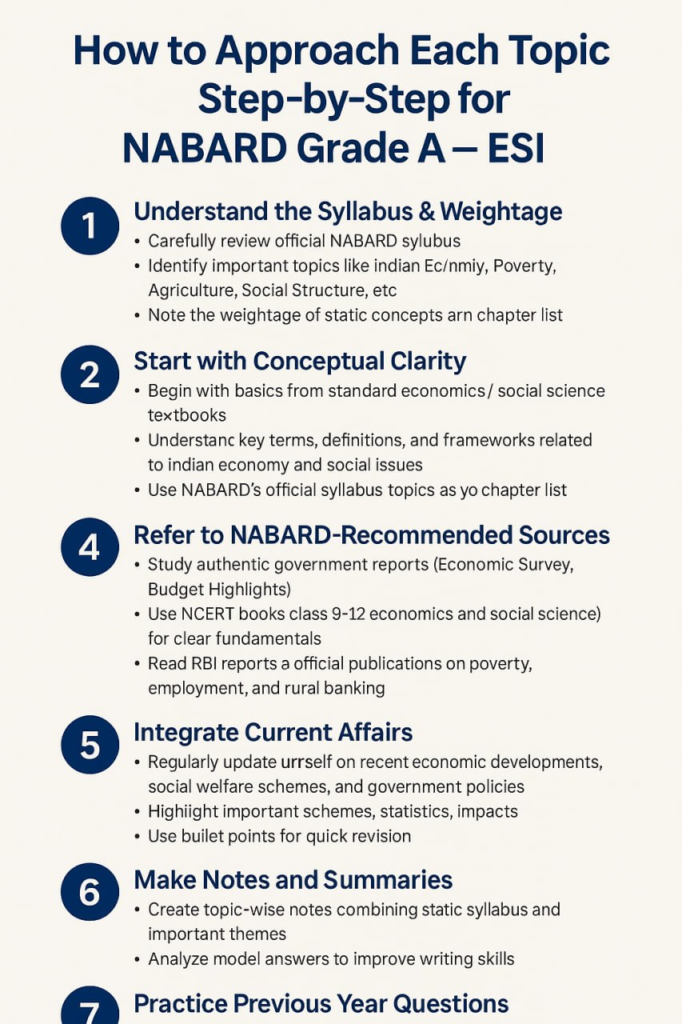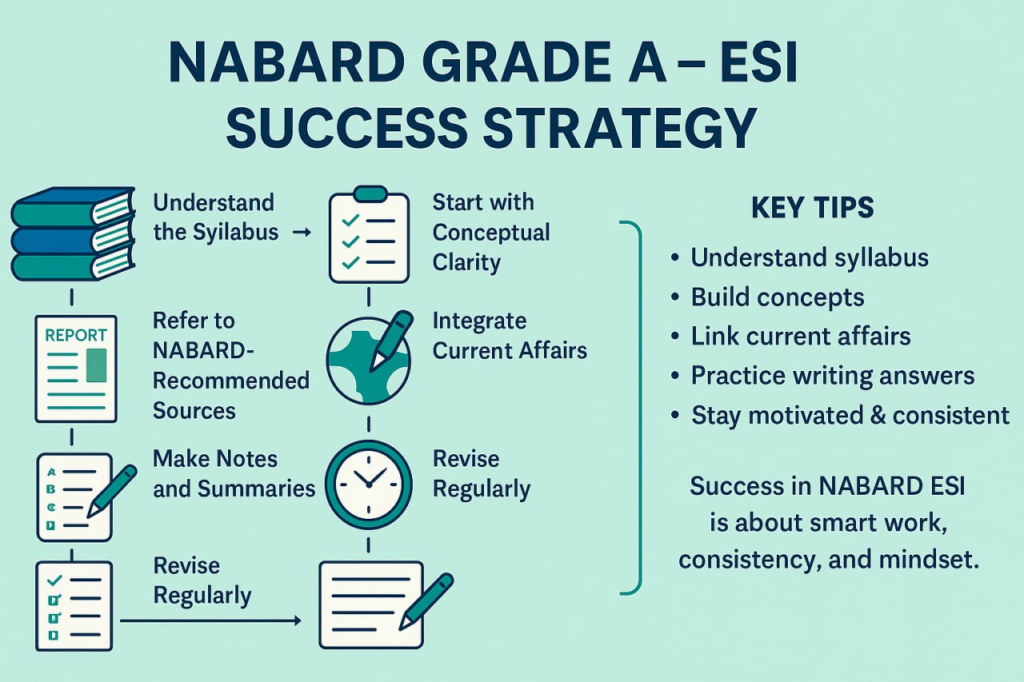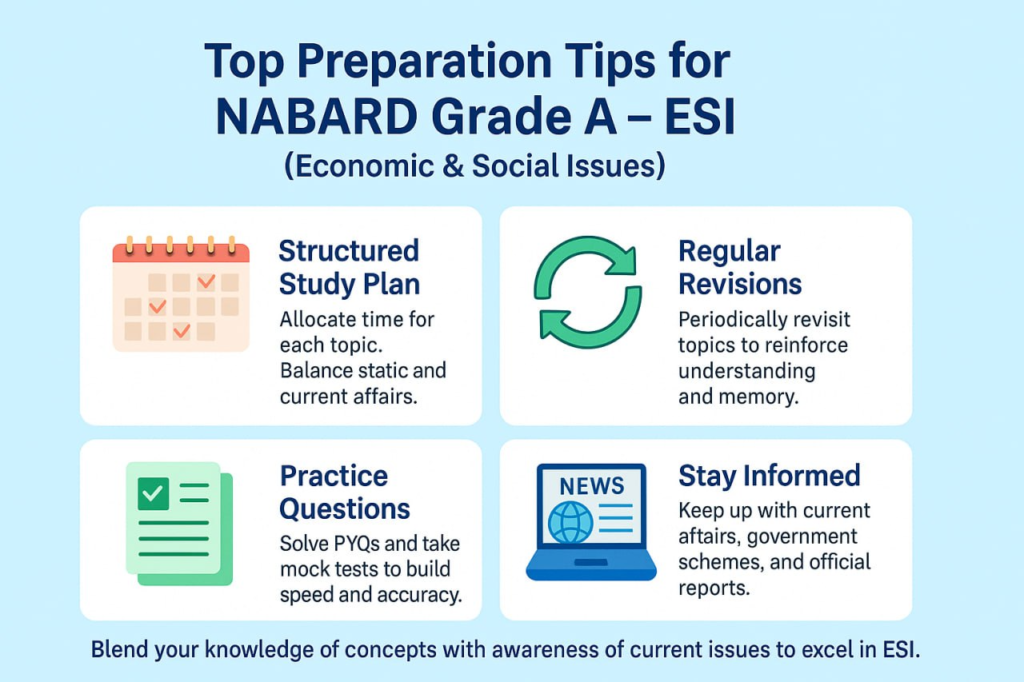
“Success in ARD isn’t about your background — it’s about your mindset, your strategy, and your will to keep going when it gets tough.”
Introduction
Economic and Social Issues (ESI) is one of the most crucial subjects in the NABARD Grade A syllabus. Preparing for ESI can feel confusing at first — especially with its mix of economics, government schemes, social issues, and reports. But here’s the good news: you don’t need to be an economics graduate to score well in ESI. What truly matters is smart preparation, conceptual clarity, and consistent revision.
Every year, aspirants from all backgrounds — whether from science, commerce, humanities, or engineering — clear ESI with confidence. Not because they’ve mastered every topic, but because they follow a structured strategy that works.
This guide is designed for everyone — whether you’re new to the subject or looking for a clear revision path.
Here’s what we’ll cover:
- What to study (both static and current)
- How to approach each topic step-by-step
- How to write impactful answers in the mains exam
So whether you’re a UPSC aspirant well-versed with socio-economic policies, a banker exploring poverty reports for the first time, or someone trying to decode the Economic Survey — this guide will simplify ESI for you.
Let’s get started and turn ESI into your strength!
What to study ?
To ace the ESI section, focus on understanding India’s economic structure, social issues, government schemes, and current socio-economic developments — all backed by clear concepts and up-to-date facts.

What to Study for NABARD Grade A – ESI ?
1. Nature of Indian Economy
- Structural and Institutional Features
- Economic Underdevelopment
- Opening Up the Indian Economy
- Globalization
- Economic Reforms in India
- Privatization
2. Inflation
- Trends in Inflation
- Impact on National Economy and Individual Income
3. Poverty Alleviation and Employment Generation
- Rural and Urban Dimensions
- Measurement of Poverty
- Government Poverty Alleviation Programs
4. Population Trends
- Population Growth and Economic Development
- Population Policy in India
5. Agriculture
- Characteristics and Status
- Technical and Institutional Changes
- Agricultural Performance
- Food Security Issues
- Rural Credit Agencies (Institutional and Non-Institutional)
6. Industry
- Industrial and Labour Policy
- Industrial Performance
- Regional Imbalance in Industrial Development
- Public Sector Enterprises
7. Rural Banking and Financial Institutions
- Reforms in Banking/Financial Sector
- Globalization of Economy
- Role of International Funding Institutions (IMF, World Bank, WTO)
- Regional Economic Cooperation
8. Social Structure in India
- Multiculturalism
- Demographic Trends
- Urbanization and Migration
- Gender Issues
- Joint Family System
- Social Infrastructure (Education, Health, Environment)
9. Education
- Status and System of Education
- Socio-Economic Problems Associated with Illiteracy
- Educational Relevance and Wastage
- Educational Policy for India
10. Social Justice
- Issues Concerning Scheduled Castes, Scheduled Tribes, and Other Backward Classes
- Socio-Economic Programs for the Underprivileged
- Positive Discrimination
- Social Movements
- Indian Political Systems
- Human Development
11. Current Economic & Social Issues
- Contemporary Developments in the Economy and Society
How to approach each topic step-by-step ?
The official NABARD syllabus itself does not explicitly detail a “step-by-step” approach to studying each topic in Economic and Social Issues (ESI), but based on the syllabus and best practices for competitive exams preparation, here’s a structured step-by-step approach aligned with the official content:
How to Approach Each Topic Step-by-Step for NABARD Grade A – ESI ?

1. Understand the Syllabus & Weightage
- Carefully review the official NABARD syllabus.
- Identify important topics like Indian Economy, Poverty, Agriculture, Social Structure, etc.
- Note the weightage of static concepts and current affairs in ESI.
2. Start with Conceptual Clarity
- Begin with basics from standard economics and social science textbooks.
- Understand key terms, definitions, and frameworks related to Indian economy and social issues.
- Use NABARD’s official syllabus topics as your chapter list.
3. Refer to NABARD-Recommended Sources
- Study authentic government reports (Economic Survey, Budget Highlights).
- Read RBI reports and official publications on poverty, employment, and rural banking.
4. Integrate Current Affairs
- Regularly update yourself on recent economic developments, social welfare schemes, and government policies.
- Link current news and data to static concepts.
- Follow official government portals, PIB releases, and NABARD’s own notifications.
5. Make Notes and Summaries
- Create topic-wise notes combining static syllabus and current updates.
- Highlight important schemes, statistics, and their impacts.
- Use bullet points for quick revision.
6. Practice Previous Year Questions
- Solve past NABARD ESI questions to understand exam pattern and important themes.
- Analyze model answers to improve writing skills.
7. Revise Regularly
- Keep revisiting notes and important reports.
- Use flashcards or mind maps to remember key facts and linkages.
8. Attempt Mock Tests & Write Answers
- Practice writing concise and structured answers for mains.
- Time your practice to improve speed and clarity.

How to Write Impactful Answers in Mains Exam – ESI NABARD Grade A ?
1. Understand the Question Clearly
- Read the question carefully to identify what is being asked (explain, analyze, discuss, etc.).
- Highlight keywords and directive terms to stay focused.
2. Plan Your Answer Briefly
- Spend 1-2 minutes outlining key points.
- Decide the structure: introduction, body, conclusion.
3. Start with a Strong Introduction
- Define key terms or give a brief overview.
- Keep it relevant and concise to set the context.
4. Organize the Body Logically
- Use headings or bullet points where possible for clarity.
- Provide balanced content: facts, data, government schemes, and real-life examples.
- Connect static concepts with current affairs to show updated knowledge.
5. Be Precise and Relevant
- Stick to the word limit; avoid unnecessary elaboration.
- Avoid vague statements; back points with data or examples.
6. Conclude Effectively
- Summarize key points.
- If asked, suggest solutions or way forward.
7. Maintain Good Presentation
- Write neatly and legibly.
- Use paragraphs and proper spacing.
- Highlight important terms or schemes with underlining or bullet points.
8. Practice Writing Regularly
- Practice writing timed answers.
- Review previous year questions and model answers.
- Get feedback to improve expression and structure.
Preparation Tips
- Structured Study Plan:
- Allocate time for each topic, balancing static and current affairs.
- Regular Revisions:
- Periodically revisit topics to reinforce understanding.
- Practice Questions:
- Solve previous years’ papers and mock tests to gauge your preparation.
- Stay Informed:
- Read newspapers, journals, and official publications related to agriculture and rural development.
By integrating a solid understanding of static topics with awareness of current developments, you can enhance your performance in the ESI section of the NABARD Grade A exam.
Watch the Success Story of Mr. Sudarshan Reddy who didn’t have any agriculture background and still got the 1st Rank in NABARD Grade A Examination with C4S Courses Mentorship.
Conclusion
Success in the NABARD Grade A ESI section is not just about hard work — it’s about smart work, consistency, and a clear strategy. By understanding the syllabus thoroughly, building strong conceptual clarity, integrating current affairs, and practicing answer writing regularly, you can transform a seemingly complex subject into your greatest strength.
Remember, your mindset and approach matter more than your background. With a focused plan, disciplined preparation, and persistent revision, you can confidently tackle the Economic and Social Issues paper and secure your place in NABARD. Stay motivated, stay curious, and keep pushing forward — your efforts will surely pay off!
With a structured plan, daily discipline, and the right resources, you can master ESI and move one step closer to your dream job at NABARD.
You’ve got this — let’s make it happen!
Watch C4S Interview videos and attend mock sessions to improve your communication and confidence. Remember, your personality and thought process matter here.
In the words of Swami Vivekananda, “Arise, awake, and stop not till the goal is reached.” Preparing for NABARD Grade A may seem challenging, but with the right mindset, structured guidance like that offered by C4S Courses, and consistent practice, success is within reach. Focus on understanding concepts, practice writing with clarity, revise smartly, and believe in your preparation journey. You’re not just preparing for a job—you’re preparing to contribute to the growth and prosperity of rural India.
Click to know details of the programme – https://learn.c4scourses.in/learn/NABARD2025

https://youtu.be/7ld6Ekq0vU8

https://www.youtube.com/playlist?list=PL6UO8P0F6ELUTnrcshRSaA8JufD3fsEju

https://www.youtube.com/playlist?list=PL6UO8P0F6ELWkAsDFSI9GqiG6Od8FBeuW

https://youtu.be/Asp69xyjx-w

https://youtu.be/JYjdjjbKI5U

https://youtube.com/live/BvHiY2Lu-uQ?feature=share
Remember, with the right strategy, dedication, and guidance, your dream of securing a prestigious position at NABARD is within reach. Stay focused, stay motivated, and make the most of every resource available to you.




















